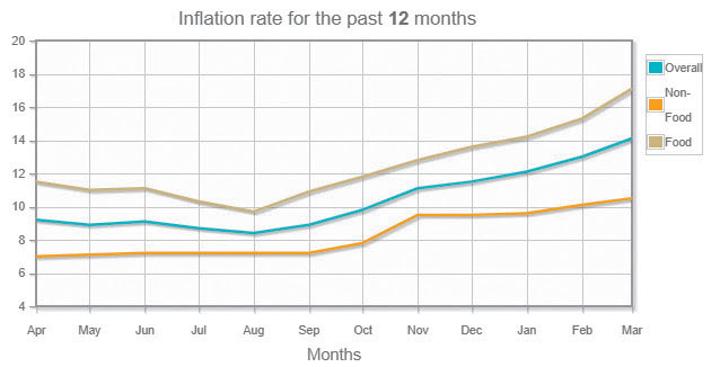Africa-Press – Malawi. The Reserve Bank of Malawi has revised upwards its annual average inflation target by 1.9 percentage points to 12.3 percent. However, economic commentators feel the adjusted target remains unrealistic, exogenous shocks persist. The central bank’s projection is contained in a statement issued on Wednesday after the second Monetary Policy Committee (MPC) meeting.
This, essentially, means headline inflation— the rate at which prices of various commodities change at a given period in an economy—could be moderate in the remaining months of the year. In the past three months, headline inflation has been on an upward spiral.
The statement indicates that inflation pressures intensified during the first quarter of 2022. Headline inflation averaged 13.1 percent in the quarter, higher than 10.8 percent recorded in the last quarter of 2021 and 8.5 percent recorded in the corresponding quarter 2021.
“The outlook points to the persistence of inflation pressures. The major sources of these pressures are the spill-over effects of the rising international commodity prices which have been exacerbated by the Russia-Ukraine war, effects of the recent increase in domestic fuel pump prices, exchange rate pressures and persistent fiscal slippages.
“In addition, the lower-than-earlier estimated agricultural food production implies that prices of locally produced food commodities will remain relatively high,” the MPC statement reads.
In an interview, Economics Association of Malawi (Ecam) Executive Director Frank Chikuta said the first quarter is the peak of the lean period in terms of food supply, hence the rising inflation.
“From the second quarter, which is the onset of the harvest season, food inflation is expected to go down. Depending on the magnitude of this drop, the average inflation for 2022 could indeed be around 12 to 13 percent.
“However, there are significant risks which could affect this projection, including cost of imported food items and second round effects of the recent hike in fuel products,” Chikuta said.
In a separate interview, University of Malawi Professor of Economics Ben Kalua said while inflation will moderate in the second quarter due to harvests, it is likely going to rocket in the third and fourth quarters of the year.
He said the country should expect inflation to rise further in the last half of the year due to external shocks. Another economist Sane Zuka said, as things stand, it will be difficult for the government to contain the inflation at 12.3 percent as desired.
“Key economic forces driving inflation remain volatile. For instance, global fuel prices have not yet stabilised, which is forcing upward adjustments to the price of fuel in the country.
“This situation will be worsened by the upward revision of policy rate from 12 percent to 14 percent as this means increased cost of capital to the private sector,” Zuka said.
According to figures from the National Statistical Office, in January 2022, headline inflation was seen at 12.1 percent and went up to 13 percent February before acceralating further by 1.1 percentage points to 14.1 percent March.
For More News And Analysis About Malawi Follow Africa-Press






